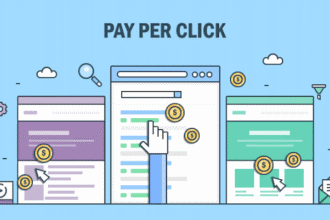PPC for Beginners might seem like a daunting world at first, but it’s an incredibly powerful tool that can instantly boost your online visibility.
Are you a small business owner, a budding entrepreneur, or an aspiring marketer looking to make an immediate impact online? You’ve likely heard the buzz about “PPC” – that magical way to get your website to the top of Google results instantly.
But then, you hit a wall. What exactly is PPC? How does it even work? And can a beginner like you actually run a successful campaign without losing your shirt?
Fear not! You’ve landed in the right place. This is your ultimate guide to PPC for beginners, designed to demystify pay-per-click advertising and equip you with the knowledge to launch your very first winning campaign. Say goodbye to the endless wait for organic rankings and hello to immediate visibility!
Let’s master PPC together!
What Exactly is PPC, and Why Should Beginners Care?
PPC (Pay-Per-Click) is an online advertising model where advertisers pay a fee each time one of their ads is clicked. Essentially, you’re buying visits to your website, rather than attempting to “earn” those visits organically.
- Think of it like this: When you search for “best laptops in Lagos” on Google, those top results labeled “Ad” are PPC ads. The advertiser pays Google every time someone clicks on their ad.
Why is PPC for Beginners a Game-Changer?
- Instant Visibility: Unlike SEO, which takes time, PPC gets you on the first page of search results immediately.
- Targeted Traffic: You can specifically target users who are actively searching for your products or services, meaning higher intent and better quality leads.
- Budget Control: You set your own budget. You decide how much you want to spend per day or per month, giving you full control.
- Measurable ROI: Every click, impression, and conversion can be tracked, allowing you to see exactly what’s working and optimize your spend.
- Level Playing Field: Even small businesses with limited brand recognition can compete directly with larger companies for prime search positions.
How Does PPC Work? The Simple Breakdown
At its core, PPC operates like an auction, but it’s not just about who pays the most.
1. Keywords are Key: You choose specific keywords that your target audience is likely to type into search engines when looking for what you offer (e.g., “affordable web design Abuja,” “buy Nigerian fashion online”).
2. The Ad Auction: When someone searches for one of your chosen keywords, an instant auction takes place. Google (or another ad platform) determines which ads will show up and in what order.
3. Ad Rank Reigns: Your position isn’t just about your bid (how much you’re willing to pay per click). It’s determined by Ad Rank, which considers: Bid Amount: Your maximum CPC (Cost-Per-Click).
Quality Score: A score Google gives your ad, keywords, and landing page based on their relevance and expected click-through rate.
A higher Quality Score means you pay less for a higher position! Ad Extensions & Format: The impact of your ad’s format (e.g., call buttons, site links).
4. The Click: If someone clicks your ad, you pay the bid amount (or slightly less, based on Google’s auction dynamics).
Mastering the Essentials: Key Components of a Winning PPC for Beginners Campaign
To launch a successful campaign, you need to understand these crucial elements:
1. Discover Your Keywords: The Foundation of Your Campaign
Your keywords are the bridge between your potential customers and your ad.
- Match Intent: Focus on keywords that show clear buying intent (e.g., “buy running shoes online” vs. “types of shoes”).
- Research Tools: Use tools like Google Keyword Planner (free!), Semrush, or Ahrefs to find relevant keywords, understand search volume, and gauge competition.
- Keyword Types: Understand broad match, phrase match, exact match, and negative keywords to control who sees your ads.
2. Craft Compelling Ad Copy: Make Them Click!
Even with the best keywords, if your ad copy isn’t persuasive, you won’t get clicks.
- Highlight Benefits: Focus on what’s in it for the customer, not just features.
- Unique Selling Proposition (USP): What makes you different? Offer a discount, free shipping, or a unique service.
- Strong Call to Action (CTA): Tell people exactly what to do (e.g., “Shop Now,” “Learn More,” “Get a Quote”).
- Relevance: Your ad text should closely match your chosen keywords and the content on your landing page.
3. Convert Visitors: Optimize Your Landing Page
The ad gets the click, but the landing page gets the conversion. This is critical for PPC for Beginners.
- Relevance is King: Your landing page must be highly relevant to the ad the user clicked.
- Clear Value Proposition: Immediately tell the visitor what you offer and why it matters.
- Simple & Focused: Remove distractions. Guide the user towards one primary action (e.g., make a purchase, fill out a form).
- Mobile-Friendly: Most searches happen on mobile devices. Ensure your page looks and functions perfectly on all screens.
4. Optimize Your Budget & Bidding: Spend Smartly
You control your budget, but smart bidding is key to maximizing its impact.
- Daily Budget: Set a comfortable daily spend limit that aligns with your overall marketing goals.
- Bidding Strategy: Start with manual CPC bidding to understand how it works, then explore automated strategies as you gain experience.
- Start Small: Don’t blow your entire budget on the first day. Begin with a smaller spend to gather data.
5. Refine Your Performance: Monitor & Adjust
PPC is an ongoing process. You can’t just “set it and forget it.”
- Track Everything: Connect your Google Ads account to Google Analytics. Monitor clicks, impressions, click-through rate (CTR), cost-per-click (CPC), and conversions.
- Adjust Keywords: Pause underperforming keywords, add new ones, and refine your match types.
- Test Ad Copy: Run A/B tests with different headlines and descriptions to see which performs best.
- Optimize Landing Pages: Continuously test elements on your landing pages to improve conversion rates.
Your Step-by-Step Path to Launching Your First PPC for Beginners Campaign
Ready to take the leap? Here’s a simplified roadmap:
- Set Up Your Google Ads Account: It’s free to create!
- Define Your Goal: What do you want to achieve? (Sales, leads, website traffic, calls?)
- Research Your Keywords: Use Keyword Planner to identify relevant terms.
- Create Your Ad Groups: Organize your keywords into tightly themed groups.
- Write Your Ad Copy: Craft compelling headlines and descriptions for each ad group.
- Design Your Landing Page: Ensure it’s relevant, clear, and optimized for conversions.
- Set Your Budget & Bids: Start conservatively.
- Launch & Monitor: Let your campaign run, then regularly check performance and make adjustments.
Common Mistakes for PPC for Beginners to Avoid
- Not Using Negative Keywords: This prevents your ads from showing for irrelevant searches (e.g., if you sell “new cars,” add “used” as a negative keyword).
- Ignoring Mobile Performance: Ensure your ads and landing pages are fully optimized for mobile devices.
- Sending All Traffic to Your Homepage: Always send users to the most relevant landing page for that specific ad.
- Setting It and Forgetting It: PPC requires ongoing optimization. Regularly check your performance.
- Lack of Clear Call to Action: Don’t leave visitors guessing what to do next.
PPC for beginners might seem complex at first, but with a structured approach and consistent optimization, it’s an incredibly powerful tool to drive targeted traffic and generate immediate results for your business.
It’s time to master this essential digital marketing strategy and unleash your online potential.






